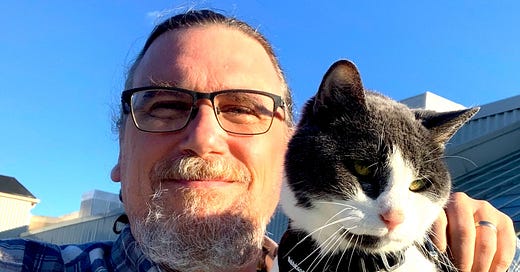What is philosophy to you?
Philosophy, to me, doesn’t name one single thing that can be neatly defined, and I grow instantly suspicious of people who have a simple answer to the question “what is philosophy?” because it turns out they’re not just wrong, but often what they have to offer under the name of “philosophy” is boring. When I introduce students to philosophy, I tell them that it’s a vast literature spanning millennia, a discipline conceived of in multiple ways, a variety of activities, some tools, techniques, and practices, and a number of traditions, schools, or movements often interpreted even from within them in multiple ways. I expect that will prove an unsatisfying answer to many people!
How were you first introduced to philosophy?
I’ve written elsewhere about the first two philosophy classes I took, back in high school. The one that was officially an introduction to philosophy class was pretty dull and doctrinaire, and might have turned me off from philosophy had it been my only encounter. The other class was officially supposed to focus on sacraments, but the substitute teacher was very much into Augustine and thought we needed to understand Plato and Aristotle, among others, to adequately understand his ideas. He also taught in a way that fostered and modeled dialogue, reflection, and argument. That gave me a sense of what philosophy might actually look like, and so when I got to college, I looked down the list of majors and picked philosophy as something I’d like to study more of. Then I just kept going, and wound up here.
How do you practice philosophy today?
I suppose in a variety of ways, some of which I’ll likely forget to mention. So, before I get into the “here’s what I do” spiel, I’ll mention that I apply philosophical ideas and practices in everyday life, where I find them useful. I’ve always been drawn to the practical side of philosophy, thinking about where and how it can make a difference. I’ve taught philosophy classes, and provided seminars and workshops, for over 25 years at this point. But I also started engaging in what they now call “public philosophy” before that recently became a buzzword, giving talks for the public, producing videos and podcast episodes, and writing for popular audiences. I also work with private clients as a philosophical counselor, and businesses and organizations as a consultant and coach.
What is a philosophical issue that is important to you?
My attention, work, and research is spread out over a number of issues and interests, probably more than is prudent! But one that has been pretty central to me for more than two decades at this point is philosophical approaches to understanding and dealing with the emotion of anger. This is a topic a number of ancient, medieval, and early modern thinkers devoted considerable attention to. They developed quite sophisticated theories and a range of useful practices for making sense of and managing this complex emotion. Often what these thinkers provide exceeds what some psychological approaches have to offer, and gets incorporated into other modalities (which is one reason for their success). My initial reason for studying what philosophers’ contributions on anger was personal, since I struggled with that emotion from childhood on. But it turned quickly into a way I could draw on philosophy to help others.
What books, podcasts, or other media have stood out to you as a philosopher?
I have to admit when it comes to videos and podcasts, I’m a producer, and not much of a consumer. I’m not a big reader of books aimed at giving popular takes on philosophy. There are some good ones. But some get matters wrong and mislead trusting readers. Others come across as the equivalent of the Steve Buscemi “Hello fellow kids” meme. The books I actually like most tend to be classed broadly as “speculative fiction.” Many fantasy, sci-fi, horror, weird, etc. authors write works that are deeply philosophical, where characters engage in dialogue, think about, apply, or embody philosophical ideas or positions. Some weave philosophy into themes, worldbuilding, and plots of their works. Unsurprisingly, I started reading and thinking about speculative fiction long before I got into philosophy.
Gregory Sadler is a writer, educator, speaker, consultant, and APPA-certified philosophical counselor. He teaches at Milwaukee Institute Of Art And Design, is a member of the Modern Stoicism team, a faculty member at the Stoa Nova, producer of the Half Hour Hegel project, co-host of the Wisdom for Life radio show, and has produced roughly 3,500 philosophy-focused videos in his YouTube channel.







Hi Gregory
The philosophy question important to me is how to bring moral relativism to an end. To help with this I've developed a new framework that is internally consistent. Please check out my profile if you would like to discuss it. Thanks
James